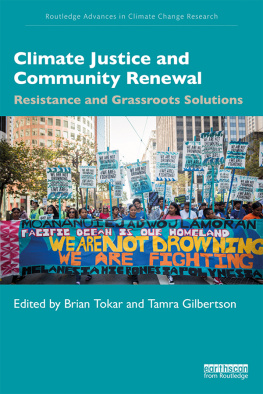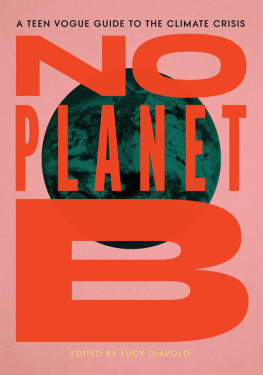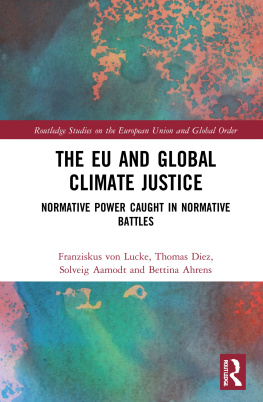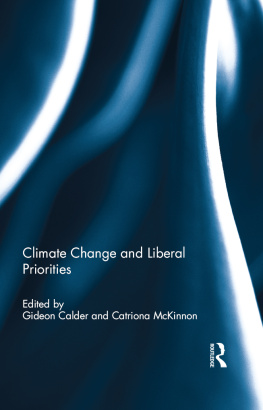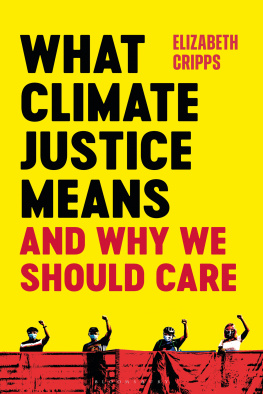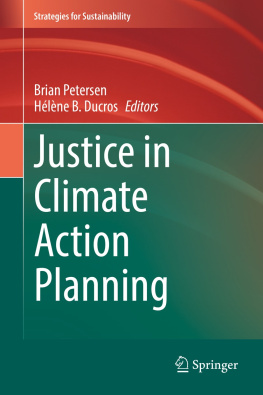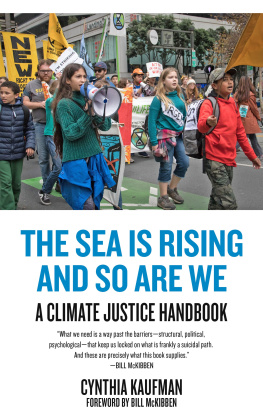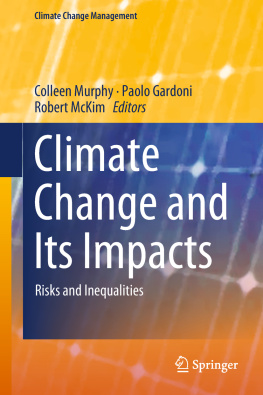Toward Climate Justice:
Perspectives on the Climate Crisis and Social Change
2010, 2014 Brian Tokar
ISBN 978-82-93064-09-1
Published by New Compass Press
Grenmarsvegen 12
N3912 Porsgrunn
Norway
Design and layout by Eirik Eiglad
New Compass presents ideas on participatory democracy, social ecology, and movement buildingfor a free, secular, and ecological society.
New Compass is Camilla Svendsen Skriung, Sveinung Legard, Eirik Eiglad, Peter Munsterman, Kristian Widqvist, Lisa Roth, Camilla Hansen, Jakob Zethelius.
new-compass.net
2014
BRIAN TOKAR
TOWARD CLIMATE JUSTICE
Perspectives on the Climate Crisis and Social Change

new-compass.net
Foreword
G lobal warming is the most immediate and vexing ecological challenge facing humanity. Only a few degrees increase in temperature may have far-reaching and dire consequences for biological diversity, ecosystem stability, and human demography.
Since the UN-initiated Intergovernmental Panel on Climate Change (IPCC) published its fourth comprehensive report in 2007, a general acceptance of an impending climate crisis has spread from scientific circles into the mainstream media. Now it is widely acknowledged that not only is our planet faced with the immediate threat of global warming, but that these climate changes are man-made.
The fact that global warming is caused by human activity does not mean that we are all equally to blame. The greenhouse gas emissions from the industrialized North have been disproportionate, and continue to be so. Indeed, the countries of the North have to a great extent developed their technological assets and global hegemony precisely through the intensive burning of fossil fuels. Paradoxically, however, the intensification of the climate crisis is likely to have the most devastating effects on people in the impoverished and underdeveloped South. Globally, the people who have contributed the least to climate-altering emissions will not only be hit hardest by increasing weather chaos and rising sea levels, but are the least prepared technologically to face the ordeals of the coming decades. Therefore, the climate crisis not only poses a challenge to our societies in a general sense, but it also challenges our sense of social justice. There is something fundamentally unfair about the fact that those populations who will be hit the hardest are those least responsible for causing the crisis in the first place. This simple recognition strikes at the heart of the climate justice issue.
As we see it, the issue of global warming and social justice may well prove to be the crucial battle for the ecology movement in the years ahead. A movement for climate justice is bound to touch upon and confront all issues regarding fair distribution, energy use, technology, infrastructure, urban reorganization, and agrarian reform, as well as the reclaiming of the commons and the potential for a participatory politics.
On a superficial level, to be sure, ecological concerns that were rightfully considered politically subversive only decades ago now have become common wisdom. However, in order to properly confront the crises of our time, we need to recover the radical messages of the ecology movement. In an immediate, practical sense, we need to look at what concrete solutions are available from a sustainable, ecological perspective. How can we act swiftly to reduce our societies dependence on fossil fuels and reduce harmful emissions? On a most practical level, new technologiesas well as more extensive and more efficient use of existing eco-technologycan ameliorate the impact of global warming, and ultimately help reverse the path that we are on.
However, we need to go beyond the very idea that new technologies will solve the ecological crisis. There are no simple solutions and there is no technical fix. If current political structures and economic imperatives remain intact, we will still have a wasteful and highly energy-demandingindeed, anti-ecological and unjustsocial order. For this reason, there is an urgent need to start defining what the outlines of an ecological society will actually look like; our answers to this question will inform how we will make full use of the liberatory potential of new technologies. Arguably it is only in a non-exploitative and liberatory social context that we can assure that the whole of societyon a global scalewill benefit from technological and scientific advances. Indeed, the adaptation of new ecological technologies requires a drastic decentralization of energy use and food production, as well as of infrastructures and political decision-making.
Further, we need to create a new global ecological movement able to define the outlines of an ecological society and struggle to actualize it. Such a movement must seek to bridge the economic and political gaps between the North and the South. Indeed, in confronting these issues the ecology movement must become truly global in its perspectives and outreach, and strive to make new bonds between activists all over the world. Importantly, we must work to compensate for the economic disadvantages forced on peasants and producers in the global South. At the same time, such a movement must develop real local political foundations, and strive to bridge the gaps between the rich and the poor in all communities, strengthen municipal political life, encourage regional ecological production, and foster communal sensibilitiesby empowering common people as responsible citizens .
To fulfill the promises of climate justice we need to ask ourselves even more questions. How can we see beyond the current environmental focus on the major climate summits (like COP 15 in Copenhagen and COP 16 in Cancn), important as they may be, and understand why they have failed to take decisive action? How can we discern and expose the fashionable false solutions propagated by the profit-hungry corporations and their lobbies? What can we learn from the escalated calls for climate justice, and how can we act accordingly? How can we work to strengthen this global movement, and make sure it lives up to its far-reaching ideals? And what may this movement learn from the theory and practice of social ecology? Brian Tokar touches upon all these questions, and more, in this book.
Brian Tokar is a seasoned activist with a long commitment to peace, justice and environmental concerns. Tokar was introduced to radical activism in New York City in the early 1970s, first in anti-war work, and then in the powerful antinuclear movement. In 1980, inspired by the ideas of social ecologist Murray Bookchin, he moved to Vermont to work with the Institute for Social Ecology (ISE), and got increasingly involved in Green politics and environmental justice. Tokar has been a key coordinator of resistance against biotechnology and genetic engineering in New England, and he founded the ISEs Climate Justice Project in 2006. He is currently the director of the ISE and an instructor in environmental studies at the University of Vermont.
Brian Tokars authorship reflects this engagement with radical ecology, and his major publications include The Green Alternative: Creating an Ecological Future (San Pedro: R. & E. Miles, 1987; Revised edition 1992), and Earth for Sale: Reclaiming Ecology in the Age of Corporate Greenwash (Boston: South End Press, 1997). Tokar has also edited books such as Redesigning Life? The Worldwide Challenge to Genetic Engineering (London: Zed Books, 2001), and Gene Traders: Biotechnology, World Trade, and the Globalization of Hunger (Burlington: Toward Freedom, 2004). His most recent book on food politics, edited with Fred Magdoff, is titled Agriculture and Food in Crisis: Conflict, Resistance, and Renewal (New York: Monthly Review, 2010). These publications all point to Tokars long-standing involvement with the ecology movement. Tokar also has written numerous essays and articles throughout the decades, engaging with the pressing environmental issues of the day.
Next page

